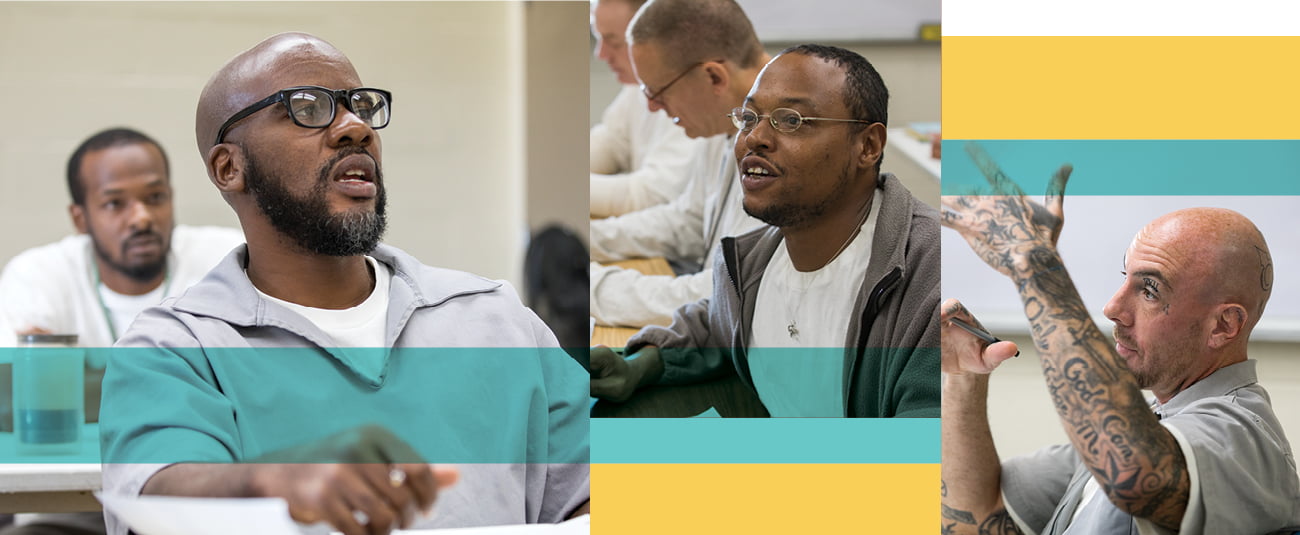Challenges conquered
Students in the Prison Education Project learn computer science the WashU way
The omnipresence of computers in our lives makes Introduction to Computer Science (CSE 131) offered by the McKelvey School of Engineering’s Department of Computer Science & Engineering the most popular undergraduate course at the university that is taken by students in all majors. While it requires no previous programming experience, it assumes that students have had high school algebra and geometry.
Most of today’s undergraduate students have been using computers throughout their education and may even have had some coding or programming experience before entering Washington University in St. Louis. But a group of WashU undergraduate students who recently took Introduction to Computer Science had little, if any, computer experience, which made the class even more valuable to their education.
Doug Shook, senior lecturer in computer science & engineering, took Introduction to Computer Science to the Missouri Eastern Correctional Center (MECC) in Pacific, Missouri, for students in University College’s Prison Education Project (PEP) in Fall 2019 and made some follow-up visits in Spring 2020 before the pandemic. Students in PEP are enrolled in the same undergraduate courses taught on the Danforth Campus as they work toward an associate’s or bachelor’s degree. While the PEP students all have earned a high school diploma or a GED, it may have been years — or even decades — since they studied basic algebra or other math classes that would prepare them for the curriculum in a computer programming course. In addition, there is no access to computers inside the correctional center for those not in an educational program.
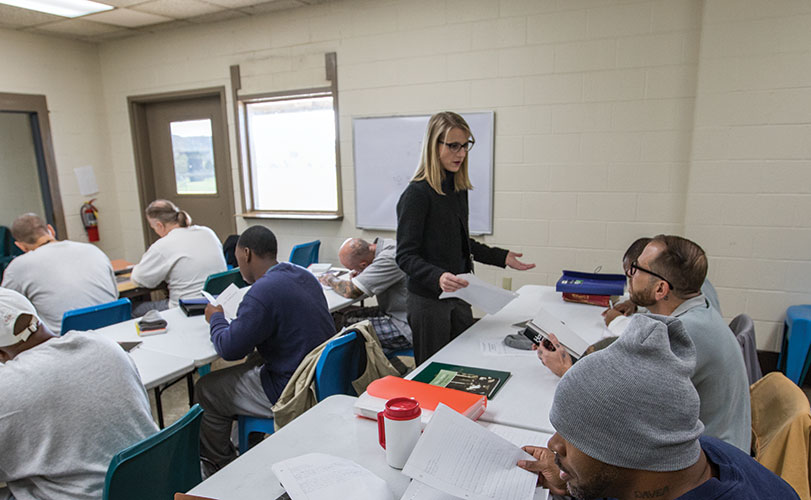
Jennifer Hudson, former lecturer in political theory, Department of Political Science, in a 2017 photo.
Photo by Joe Angeles
Intro to Computer Science teaches students how to solve problems, introduces processes and algorithms, procedural and data abstraction, encapsulation and object-oriented programming, and requires homework outside of the lecture periods. On the Danforth Campus, the class is taught through a “flipped classroom” approach, in which students view lectures online before going to class, allowing class time for discussion, questions and hands-on learning. Since there was a shortage of computers at the correctional center, Shook delivered the lectures during the weekly three-hour class period.
Shook, who has taught CSE 131 for seven years, planned to teach as much of the original curriculum as possible at MECC. But when he arrived there, he found a different situation.
"I walked in expecting to teach a class the same way I always had, but it was a completely different experience... For the first month, I taught a computer science class without computers. We did the best we could with a whiteboard and a pencil and paper."
– Doug Shook, Senior Lecturer in Computer Science & Engineering
After the computers arrived, Shook had to make some adjustments to the software, and the projector Shook needed to show his computer screen to the class took yet another month to arrive.
Despite these challenges, Shook and the students were determined to make the class a success.
“The students were extremely dedicated,” Shook said. “It was quite painful to see that they wanted to work on more outside of class, but they were only allowed to be in the classroom for three hours in the morning and three hours in the afternoon, and sometimes there was another class in there, so it wasn't available to them. It was very difficult to ask students to write code on a sheet of paper and type it into the computer later.” Mariah Yelenick, who earned a bachelor’s degree from WashU in computer science in 2020, was the teaching assistant for the course at MECC. She had been the TA for Shook’s class for several semesters, so she volunteered for the role. Originally, she went with Shook to be there during the three-hour class period, but they quickly realized it would be more useful to the students if she were there for a different three-hour time period to offer more help.
“I was helping them with their labs, with debugging, with hands-on work while they were working on their homework, and preparing for exams,” she said. “The guys in the prison cared so much about this class. They did every single reading we assigned them, they worked in the evenings together, formed study groups and cared so much about learning. For these guys, taking a computer science class made a bigger difference than for a traditional WashU student because they were starting with so much less, so in terms of rate of return on the time spent teaching, it was definitely higher at the prison. It really rejuvenated my desire to teach.”
Yelenick continued to go to MECC until mid-March 2020, when the university moved classes online due to the COVID-19 pandemic, and MECC closed to outside visitors. She now works as a data scientist at a nonprofit corporation in the Washington, D.C. area. She also is in graduate school and volunteers with Microsoft’s Technology Education and Literacy in Schools (TEALS) program, which helps high school teachers learn to teach computer science.
“My experiences at MECC were overwhelmingly positive,” she said. “Teaching people computer science is one of the best things for someone’s education, even if they don't pursue it as a career. It changes the way your brain thinks.”
Learning while incarcerated
PEP offers the same liberal arts courses taught by mostly tenured/tenure-track faculty that are offered on the Danforth Campus through the College of Arts & Sciences. Students study social sciences, humanities, math and natural sciences, as well as literature and foreign languages. The computer science course was a recent addition to the curriculum.
Barbara Baumgartner, teaching professor in Women, Gender, and Sexuality Studies and associate director of PEP for five years, said students had expressed interest in learning to code.
“We really wanted them to have a computer science class rather than a coding class,” she said. “We reached out to Ron Cytron (professor of computer science & engineering), who thought it was a wonderful idea and introduced us to Doug Shook.”
It takes PEP students about three years to earn an associate’s degree and about six to earn a bachelor’s degree, said Robert Henke, who, along with the late Maggie Garb, was co-director for seven years. Students can apply credits from other colleges and universities toward the 60 credits needed for an associate’s and 120 credits needed for a bachelor’s. They must maintain a minimum 2.7 GPA to enroll in a degree program. If they haven't completed their degree by the time they are released, they may continue seamlessly into University College on the Danforth Campus. Some of those who have completed their bachelor’s degrees have continued onto graduate school or are planning to begin.
The Prison Education Project recently received a nearly $1 million innovation grant from the Andrew W. Mellon Foundation to develop a learning management system, similar to the Blackboard or Canvas systems used on the Danforth Campus, to be used at MECC and the Women’s Eastern Reception, Diagnostic and Correctional Center in Vandalia, Missouri. It doesn't require an Internet connection and can deliver educational content to anyone in the prisons. By the end of 2022, PEP expects to have computers installed and operational at both facilities.
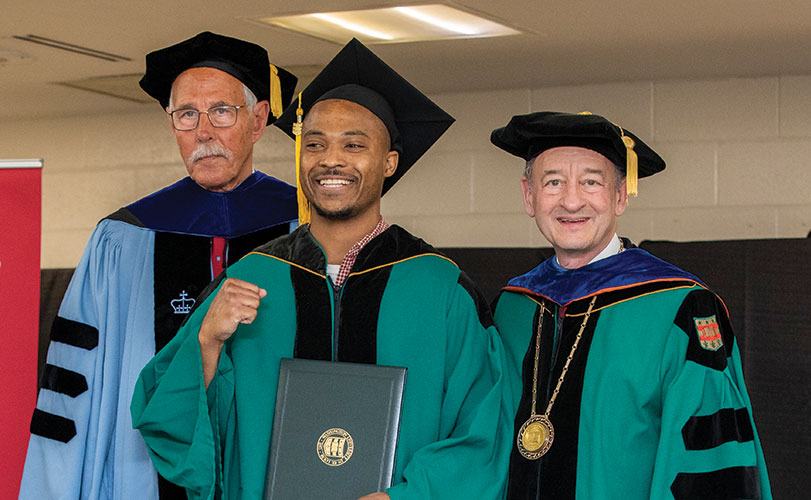
Jerome “JJ” Taylor celebrates his associate’s degree with former University College Dean Mark Rollins and Chancellor Emeritus Mark Wrighton
The grant also includes funding for a reentry program that helps PEP students and alumni find housing, jobs and funding to continue their education after their release from prison. Another organization that provides support for reentry is the St. Louis Reentry Collective, co-founded by Harvey Galler, who was a student in Shook’s computer science class at MECC before his release in December 2019.
Galler had computer experience before he was incarcerated, so he wasn't as interested in taking the course until his cellmate and some others in PEP convinced him to join them. He said not having computers for the first month and having students with a wide variety of computer knowledge made it difficult, but taking the class was well worth it.
Since the students could not remove the laptops from the classroom or study hall area, they had some basic tablets that they could take back to their cells that allowed them to watch the lecture videos that provided basic introductory skills and logic in preparation for learning programming.
Galler took classes on the Danforth Campus in the Winter 2020 semester toward completing a bachelor’s degree, but the shift to virtual learning was a difficult one for him. He’s proud of his 3.97 GPA and plans to return to in-person classes in the near future. He and the other members of the St. Louis Reentry Collective are working on a documentary series focusing on those impacted by the prison system.
"I did learn a little about programming, more than I already knew, and I did learn about myself, like how to develop patience."
– Harvey Galler, University College's Prison Education Project (PEP) Student
Jerome “JJ” Taylor, another PEP student who took computer science at MECC, is Galler’s friend and former cellmate. Taylor said he was excited to take the course to learn about algorithms and felt he had a solid math background going into the class. Although he received a B in the course, he felt as though he had failed.
“I placed extremely high expectations for myself after being homeless with a drug addiction, receiving a conviction and a gunshot wound to the back from the police,” Taylor said. “Therefore, anything below the best (in this case an A) was considered a huge failure, because I felt that I failed myself throughout the duration of my existence. I had to learn that just because you might not grasp it, it doesn’t make you a slow person. It’s one thing to fail, and it’s another thing to let the failure consume you.”
Taylor said his B grade in the class propelled him to apply to LaunchCode’s programming boot camp, which he began in September 2021. When he earned his bachelor’s degree in August 2021, he became the first man in his family to do so. Based on his experience in PEP, he has plans to launch a community-based STEM initiative in the future.
Galler, who now runs a resale business in addition to working with the STL Reentry Collective, said he appreciated Shook and his effort to make the most of the class despite the obstacles.
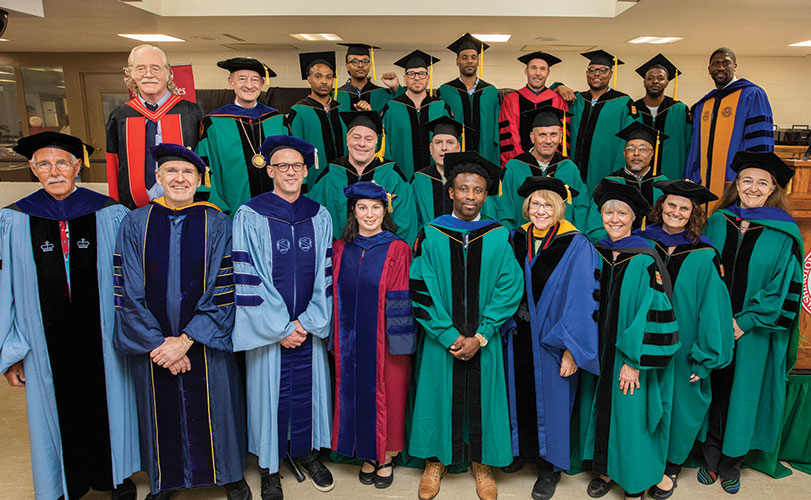
The 2019 graduates with faculty at the Commencement ceremony.
“He was really patient,” Galler said. “He wanted to make sure that everyone understood, so we didn’t even make it through a quarter of the material.”
Taylor said Shook was one of the best things about his experience in the class.
“He didn’t give up on us,” Taylor said. “He did what he knew to do as a professor with a subject like computer science that is so theoretical, straightforward and unemotional. Here you’ve got this guy teaching one of the most indifferent disciplines you can teach, and he had so much conviction trying to make sure that we grasped it.”
Shook said while the class offered numerous challenges, he feels like he owes it to students at MECC to go back and teach it again.
“It drove me to try even harder to get it to where I think it should be,” Shook said. “Just seeing how much work there is left to do, I want to go back in there and do it. It’s our duty as a university to do that work.”
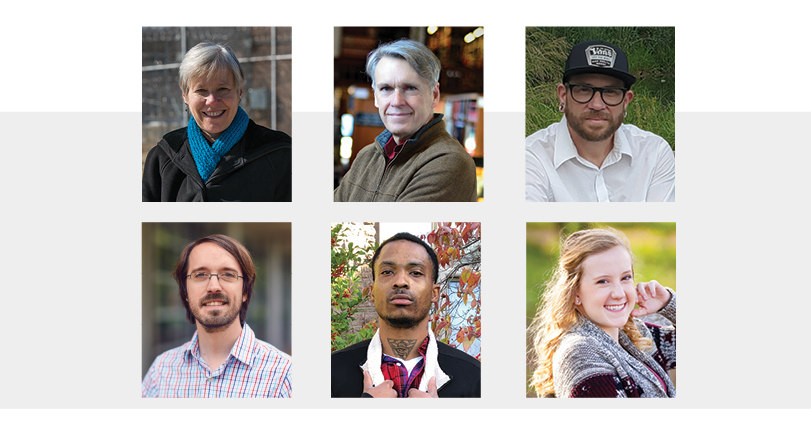
Meet the people involved with the computer science course offered through PEP (clockwise from top).
Barbara Baumgartner, Associate Director of PEP for five years; Robert Henke, Co-director of PEP for seven years; Harvey Galler, PEP Student; Doug Shook, Lecturer for the course at MECC; Jerome “JJ” Taylor, PEP Student (photo by Natasha Narayanan); Mariah Yelenick, Teaching Assistant for the course at MECC
For more information about PEP, visit prisonedproject.wustl.edu.
Back to Engineering Momentum

